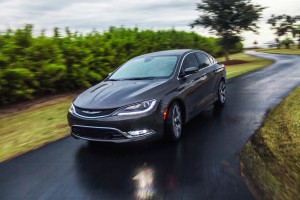With low oil prices and the slowdown of the Chinese economy, Fiat Chrysler Automobiles plans to put greater emphasis on Jeep, stretch out its ambitious plans for Alfa Romeo and build more trucks from its existing plants without disrupting production of its best-selling models.
Sergio Marchionne, FCA’s chief executive officer, acknowledging that the North American markets is critical to the company, said the company will continue move away from building passenger cars, such as the Dodge Dart and Chrysler 200, as it finds a way to build a new generation of sport-utility vehicles and pickup trucks with new powertrains demanded by regulators around the world.
“We have decided, from the manufacturing standpoint, to de-focus on passenger car market,” he said during a conference call with Wall Street analysts on Wednesday. “There are two cars in particular, the Dodge Dart and Chrysler 200, which will run their course.”
“Without creating additional capacity in the United States, we need to try and deal with the development of both Jeep and the Ram brand,” he added.
FCA spent more than $1 billion preparing the Sterling Heights, Michigan, plant for production of passenger cars designed using architecture provided by Fiat as part of its post-bankruptcy takeover of Chrysler Group back in 2009.
(Fiat Chrysler earnings slide 40%. To get the details, Click Here.)
Going forward, FCA powertrains will include hybrids of various descriptions as well as some diesel engines, Marchionne said.
FCA’s strategy and plans have been altered since he first outlined the company’s future back in 2014 due to new developments in the market that have seen gasoline prices fall to less than $2 per gallon on average and a shift in buying patterns among Americans back to crossovers and trucks instead of more fuel-efficient cars.
The strategy is also designed to help the automaker boost production capacity for Ram and Jeep vehicles. But Marchionne stopped short of offering specifics on productions shifts among FCA’s existing plants, including moving production of the Ram 1500 to the Sterling Heights assembly plant, shifting production of the Jeep Cherokee to Belvidere, Illinois, and re-tooling the Toledo (Ohio) North Assembly plant to build the next version of the Jeep Wrangler as well as a new Jeep pickup.
In addition, the Warren, Michigan, truck plant will be revamped to build a new version of the Jeep Grand Wagoneer.
(Jeep set to return to the pickup market. Click Here for the latest.)
Marchionne said one of the biggest challenges for FCA is to figure out how to increase truck and Jeep production without disrupting sales that could hurt the company’s revenue stream during a period when revenue generation on the European or Fiat half of the company remains under intense competitive pressure.
In addition, the company’s ambitious plans for turning Alfa Romeo into a global luxury brand are being stretched out and refocused because of the slowdown in China’s economy. Marchionne also hinted that the Dart and Chrysler 200 could return to the market if FCA found another manufacturer that is willing to build the cars.
Even without a surge of growth in China, he said, FCA is now is aiming to sell more than 2 million Jeeps globally by 2018, an increase from its prior target of 1.9 million. FCA sold more than 1.2 million Jeep SUVs globally in 2015 – the most in the history of the brand.
FCA will “recadence” the timing of the Alfa Romeo models and is now aiming for more sales to come from North America and Europe than in the 2014 plan.
(Marchionne outlines new road map for FCA during Detroit Auto Show newser. Click Here for the story.)
Marchionne said the automaker still plans to launch the Alfa Romeo Giulia sedan in the U.S. by the end of the summer. While the small Alfa Romeo 4C roadster went on sale in the U.S. last year, the Giulia is expected to be the first car to appeal to mainstream premium car buyers since Fiat pulled the brand out of the U.S. in the mid-1990s.



I’ve written here before how surprising it is to see the Fiat Freemont [Journey] in places where little hatchbacks have always ruled. Now the Jeep Renegade, with the same 2.0 L turbo diesel as the Freemont is popping up all over Europe. And everywhere except southern Europe a few Wranglers, very expensive but with a big 2.8 L non-turbo diesel with the grunt to go anywhere, are on lots of wish lists. And fuel hasn’t had anything like the price drop its had here – I think FCA has winners for every continent if they just sort them out.
Focusing on trucks is great in the short-medium term, except that fuel prices will eventually go up AND they need to hit CAFE. Will they be ready when things, as they inevitably do, change?
FCA doesn’t have a snowball’s chance in Hell of meeting the 54.5 mpg CAFE requirement. In fact no major auto maker who sells predominantly SUVs, trucks and autos has a chance of complying with the absurd 54.5 mpg requirement. That’s why they are all trying to flood the market with EVs, hybrids and bicycles to reduce the fines that will be imposed and passed on to customers. FCA isn’t likely to even be around as a Fiat subsidiary by 2025. I’d be willing to bet FCA is gone by 2020.